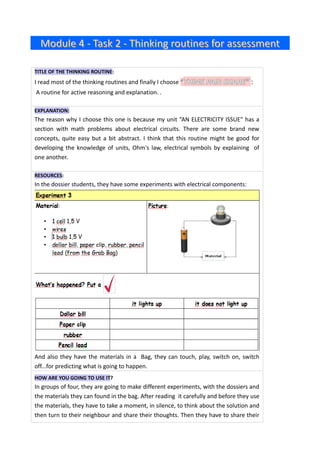Modul 4 task 2
- 1. Module 4 - Task 2 - Thinking routines for assessmentModule 4 - Task 2 - Thinking routines for assessment TITLE OF THE THINKING ROUTINE: I read most of the thinking routines and finally I choose ““THINK PAIR SHARE”THINK PAIR SHARE” :: A routine for active reasoning and explanation. . EXPLANATION: The reason why I choose this one is because my unit “AN ELECTRICITY ISSUE” has a section with math problems about electrical circuits. There are some brand new concepts, quite easy but a bit abstract. I think that this routine might be good for developing the knowledge of units, Ohm's law, electrical symbols by explaining of one another. RESOURCES: In the dossier students, they have some experiments with electrical components: And also they have the materials in a Bag, they can touch, play, switch on, switch off...for predicting what is going to happen. HOW ARE YOU GOING TO USE IT? In groups of four, they are going to make different experiments, with the dossiers and the materials they can found in the bag. After reading it carefully and before they use the materials, they have to take a moment, in silence, to think about the solution and then turn to their neighbour and share their thoughts. Then they have to share their
- 2. ideas with the other pair. The last part of the routine has to be the check out with the electrical components. It's important to scaffold students by reminding them to take turns, listen carefully and ask questions of one another.

